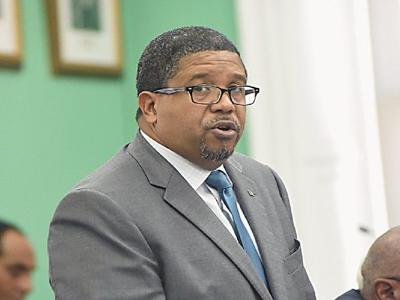(Trinidad Express) – The BAHAMAS on Sunday indicated that it has applied to the International Monetary Fund (IMF) to take advantage of a low-cost, emergency loan facility that is available to all of its member countries.
The loan amount is approximately US$252 million and falls within the borrowing authorisation approved in the Supplementary “Hurricane Dorian” Budget in February. The additional resources will support the Government’s ongoing coronavirus (Covid-19) response and other budgetary operations, according to a press release on the Government of The Bahamas website.
“This loan is not a structural adjustment facility. It does not involve the conditionality elements normally associated with the IMF facilities that most are familiar with. This facility is a low-cost option, with an interest rate of some 1.054% that we are smartly availing ourselves to address our current needs,” said Peter Turnquest, Deputy Prime Minister and Minister of Finance in the Bahamas government.
Since Covid-19, some 27 countries have accessed financial assistance using the IMF’s Rapid Financing Instrument (RFI), including other Caricom countries. Member countries with stable debt can apply for this facility when they have had a major economic shock, such as those caused by wide fluctuations in commodity prices, natural disasters, or other emergencies – in this case Covid-19.
“In a few days, we are going to present a new budget and it will continue to reflect the double impact of Hurricane Dorian and Covid-19. However, we have demonstrated that our approach to addressing these emergencies is to focus on the health and safety of Bahamians, social protection for the most vulnerable, and the need to sustain employment. These priorities will continue into the new budget, as we work to stabilise the domestic economy and plant the seeds of recovery. This loan facility assists us with meeting our existing obligations through the end of the fiscal year, as has been approved by Parliament during the Supplemental ‘Hurricane Dorian’ exercise,” said Turnquest.
“This particular low-cost facility is a one-time deal that cannot be used again until repaid. A simple way to think of this is like borrowing against the value of your ownership in a company. The Bahamas has a quota in the IMF which can be likened to its ownership of shares in the IMF. Borrowing against these shares is normally at a lower interest rate than borrowing from a commercial source, and therefore a more favourable option for emergencies like the one we face today,” said Minister Turnquest.
IMF board meeting is planned for early June and, if approved, the funds would be made available to the government within three business days. Again, unlike with IMF-supported programmes, there are no conditions or prior policy actions that the government must take before the funds from the RFI can be disbursed.More in Home
While the Bahamas government could have negotiated a loan with other financial institutions, the RFI is indisputably the better option, in the current circumstances, given its fast-disbursing nature and low interest rate.
Although the loan must be repaid in five years, the grace period of three years is favourable as this will give the government time to refinance the loan for a longer time horizon, if it deems fit.
S Vincent and the Grenadines last week became the sixth member of the Caribbean Community (Caricom) to receive funding from the IMF to help cover its balance of payment and fiscal needs stemming from the outbreak of the Covid-19 pandemic.
The IMF’s executive board approved the disbursement of US$16 million to St Vincent and the Grenadines, following its request under the Rapid Credit Facility (RCF) mechanism.
The disbursement, which will be quickly disbursed and with few conditions, is set at the maximum available access under the RCF instrument of 100 per cent of quota. St Vincent and the Grenadines is a small state, vulnerable to external shocks, including large natural disasters.
The accompanying table indicates that the six Caricom member states received US$713.2 million between April 17 and yesterday, with Jamaica receiving the largest sum at US$520 million and Dominica receiving the smallest at US$14 million.
Five of the nations received IMF funding under the Rapid Credit Facility (RCF), which is disbursed to small and vulnerable countries or those with low incomes. Jamaica’s disbursement is under the Rapid Financing Instrument (RFI).
State Date of approval Amount approved Type of funding
St Vincent May 20 US$16 million RCF
Jamaica May 15 US$520 million RFI
St Lucia April 28 US$29.2 million RCF
Grenada April 28 US$22.4 million RCF
Dominica April 28 US$14 million RCF
Haiti April 17 US$111.6 million RCF
TOTAL US$713.2 million
The IMF disburses funds under these two programmes based on the size of the country’s Special Drawing Rights (SDRs). All of the six Caricom countries, except Haiti, opted to receive 100 per cent of their quota.
Trinidad and Tobago, with SDR 241.85 million, would receive US$330 million, at last week’s exchange rate, if it applied for Covid-19 funding from the IMF for its fiscal and balance of payment needs.

